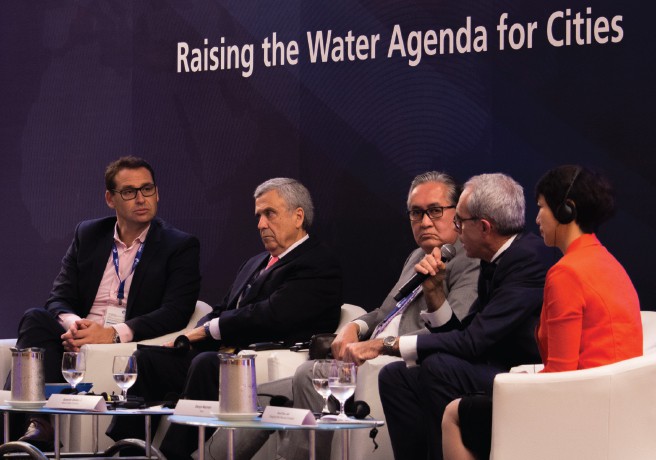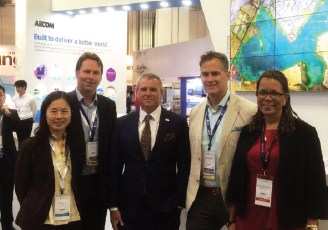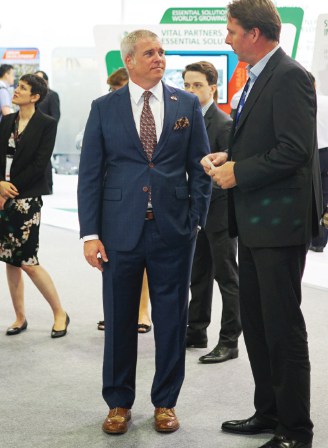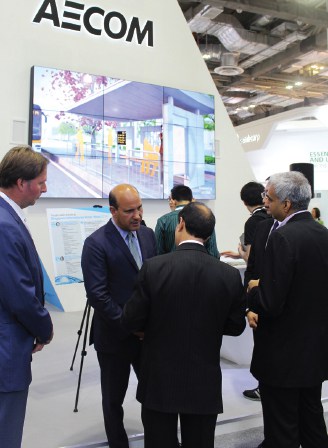Singapore International Water Week
With headline topics around closing the water infrastructure gap and fostering an integrated approach to the management of this vital resource, the 2016 Singapore International Water Week continued to assert its position as a leading global platform for business, technology and solutions in the water industry. Conference correspondent Tim McNamara reports on the mega biennial event, which this year attracted more than 21,000 participants from 115 countries and regions
Held in conjunction with the fifth World Cities Summit and the third CleanEnviro Summit Singapore, this year’s seventh Singapore International Water Week (SIWW) — which took place at the Sands Expo and Convention Centre, Marina Bay Sands — meant business, with hard-hitting panel discussions and engaging forums generating provocative and innovative ideas.

SIWW is part of the Singapore Government’s strategic program to grow the water industry and develop sustainable water technologies. Its industry importance was demonstrated by the stream of announcements on awarded projects, tenders, investments, memoranda of understanding, partnerships and R&D collaborations amounting to more than US$11 billion (S$15 billion).
Speaking as a panelist in a CNBC-led discussion on The Future of the World’s Water: A Business Perspective, AECOM Chairman and Chief Executive Officer Mike Burke underlined the necessity for a collective approach to water management.
“Closing the infrastructure gap, and improving access to clean drinking water in many parts of the world require government, communities, businesses and water providers to come together to rethink how they plan for, invest and maintain water infrastructure,’’ he said.
With leadership a recurring theme among participants as what’s required to redefine and drive the global water agenda, this year’s SIWW presented the ideal platform bringing together more than 500 global water leaders from across government, utilities, international organizations, academia and private companies.

Water issues are still not high enough on the agenda of most cities. It’s critical to champion an integrated approach. You really have to look into the environment, urban development, policies and financing.
Sean Chiao, President of AECOM’s Asia-Pacific geography
At the three-day Water Leaders Summit, part of SIWW, Dr. Han Seung-soo, United Nations Secretary-General’s Special Envoy for Disaster Risk Reduction and Water and former Prime Minister of the Republic of Korea, was joined by Benedito Braga, President, World Water Council and other business and industry leaders to discuss water accessibility, sustainability and supply resilience.
Chairing the Water Leaders Summit Insights Session on Raising the Water Agenda for Cities, Sean Chiao, President of AECOM’s Asia-Pacific geography, said this year’s event underlined the ongoing disparity between developed and developing nations in terms of water management.
“Water issues are still not high enough on the agenda of most cities,” he said. “Different countries have different degrees of sophistication with regards to how they deal with water challenges.”
Chiao continued: “In developed countries, we can say the basic needs are already resolved, but in emerging nations we’re still struggling with the fundamentals.
“It’s critical to champion an integrated approach. You cannot treat water as just one single element — you really have to look into the environment, urban development, policies, and financing.”
The Lee Kuan Yew Water Prize, a highlight of SIWW that honors outstanding contributions by individuals or organizations towards solving the world’s water challenges, was this year awarded to world-renowned hydrogeologist Professor John Anthony Cherry for his contributions to scientific understanding, technology advancements and policy influences in groundwater management.









